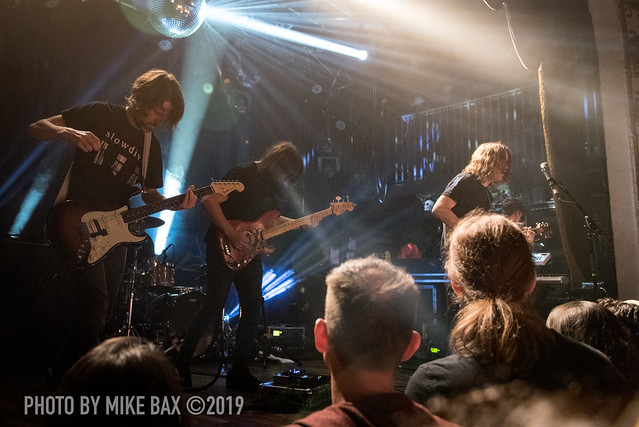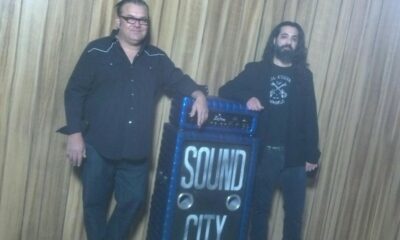Interviews
GOD IS AN ASTRONAUT Discuss the Origins of ‘Epitaph,’ Working with Fursy Teyssier, Touring, and Demos
When post-rock group God Is An Astronaut hit Toronto’s The Opera House in late September, we spoke with brothers Torsten and Niels Kinsella about their ninth album Epitaph (Napalm Records) and playing European festivals with the likes of Monolord, Converge, and Crowbar.
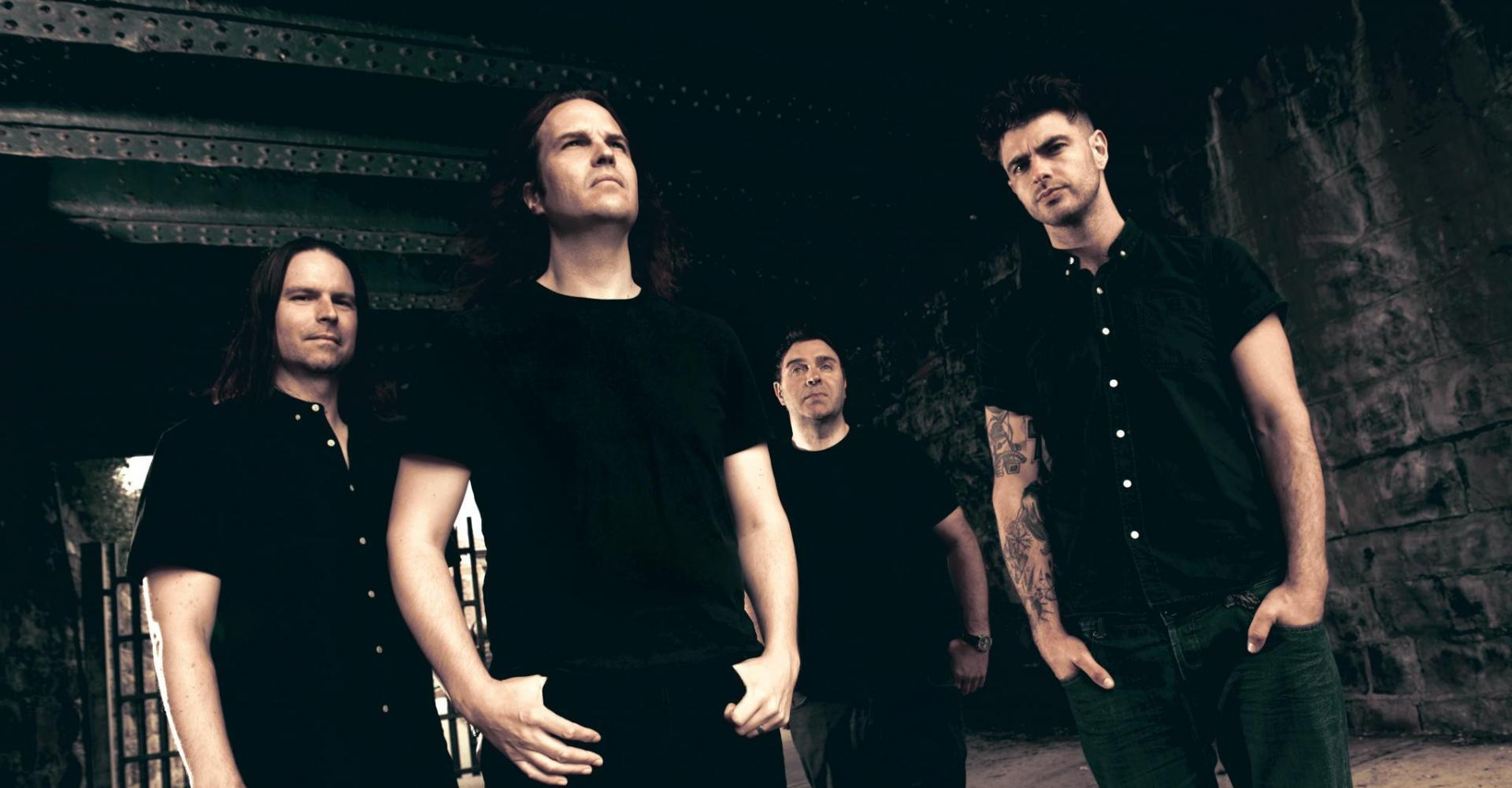
God Is An Astronaut (GIAA) hails from Glen of the Downs, Ireland (County Wicklow). The group consists of brothers Torsten (guitar, piano/synths) and Niels Kinsella (bass), Lloyd Hanney (drums), Robert Murphy (of Xenon Field; guitar/keys), and Gazz Carr (of The Butterfly Explosion; guitar/keys). Their ninth album Epitaph is their first release on Napalm Records. GIAA’s music is of the post-rock genre, akin to bands like Mogwai and Explosions In The Sky.
Almost three years since GIAA’s last Toronto performance at Mod Club Theatre, the band returned to a larger hall (with a bigger audience) to perform some of their most downbeat material to date. Epitaph is an album drenched in melancholy. It’s a record written after the passing of Torsten and Niels’ seven-year-old cousin and is mostly a coming-to-terms with the emptiness that follows the death of a young child.
GIAA performed four songs from Epitaph along with a decent selection of older material that drew from The End of the Beginning (2002), and All Is Violent, All Is Bright (2005). Toronto enjoyed a majestic evening of backlit, high-decibel material complete with occasional droning vocals from Torsten. Their live sound lands them somewhere in the spectrum of Sigur Ros, Tangerine Dream, and Russian Circles. Their live show was nothing short of amazing.
Before their Toronto show, we were invited to talk with Torsten and Niels about the new album. Lloyd, Rob, and Gazz were present as well and moved about the green room during the interview. Towards the end of our chat, Torsten brought Rob into the conversation to talk a bit about GIAA demos, and how it is working with the original song ideas. We sit down and discuss heavy music to start. I’m wearing a Monolord t-shirt, and Torsten and Niels share some stories of playing festivals in Europe with Monolord, Converge, and Crowbar. That conversation leads into Napalm Records; God Is An Astronaut’s current label.
In its entirety, check out the music video for the title track off of Epitaph:
Were you playing with these heavy bands before signing to Napalm?
Niels Kinsella: “It’s just in the last few years.”
Torsten Kinsella: “The last few years. Before Napalm Records.”
Niels: “We were playing metal festivals before them.”
Torsten: “We’ve done Brutal Assault.”
Niels: “That one is in the Czech Republic.”
Torsten: “Slayer was headling that one. They were on a different stage, and we were in a different tent. (to Niels) What’s that band that was on before us? The dark metal band from Norway?”
Niels: “Oh, Gaahl. That was God Seed. They’re the band that burned all the churches down.”
Oh, that guy. Yeah.
Torsten: “He was really scary. This would be around two months ago. We saw him and said, ’That guy looks familiar.’ We’d played with him before when Cult Of Luna was curating this festival in England, and he was on that bill too. He was scary then, and he’s scary now.”
Niels: “Yeah, he used to play with Gorgoroth.”
Torsten: “The guy isn’t messing around. You’d think he was just putting on this face, right? A lot of them it’s just pantomime; they put the face on, and then they smile and laugh while they play and get into character. This guy, he was in character all day.”
Some of them are right into it. Yeah.
Torsten: “Even before the face painting, he was very serious. Very serious.”
God Is An Astronaut’s eighth, and latest album Epitaph was released on April 27th, 2018 via Napalm Records:
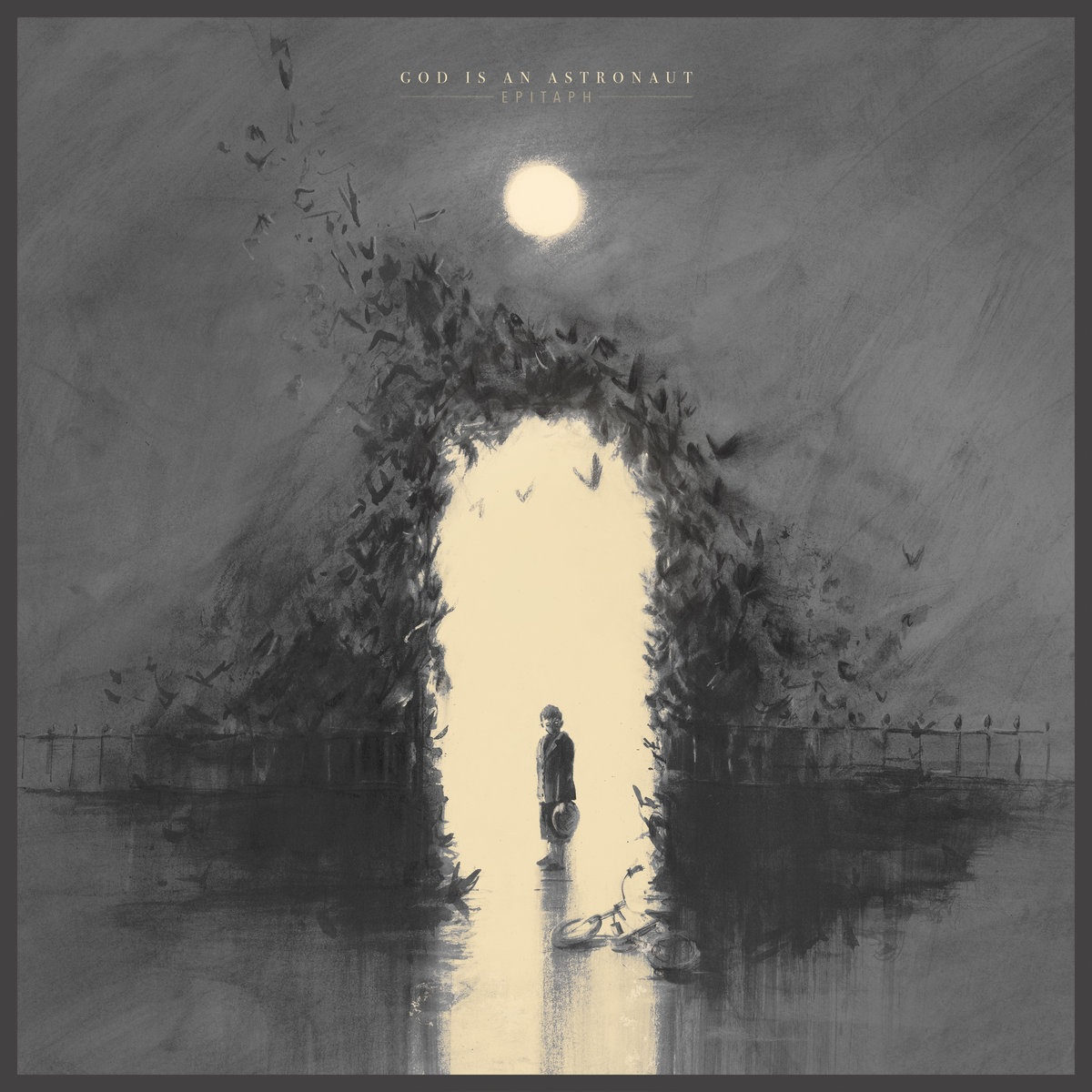
Well, I feel like every time you play Toronto, I need to say thanks. I recognize that we are a smaller marketplace than you would get in Europe.
Torsten: “Toronto has been really good to us.”
Niels: “The tickets sell really good here in Canada. The albums too.”
Torsten: “For us, I think there’s a future for us to return to Canada. More so than the U.S. because with the U.S., there are those very harsh visas. It makes it feel hard. And then there’s the taxes thing. The state taxes are quite steep. I don’t know what it’s like up here.”
Niels: “They are steep here as well.”
Torsten: “Not as bad as the U.S. though. The U.S. is pretty harsh. Right from the beginning, you are trying to operate, thinking, ’how much money are you going to lose?’ Not so much on how much money you might make. That’s the problem with playing in the U.S. They don’t look after accommodations, unlike Europe. It’s just a lot easier to work in Europe for us. I think they do look after the U.S. and Canadian bands a lot better in Europe.”
Niels: “They don’t pay any taxes.”
Torsten: “There’s no taxes.”
Niels: “U.S. bands don’t pay any taxes. Canadian bands don’t pay any tax either.”
Torsten: “There’s a lack of equality I think. For an American band to come over and play Germany, It’s very easy for them to do. It’s next to impossible for German or European acts to come over here. I don’t think any U.S. fanbase realizes how next to impossible it is. The amount of red tape, now they are even saying that we need a Carnet to come through here.”
For your gear?
Niels: “Mm-hmm. Even on the plane now, they are asking for a Carnet.”
Torsten: “We had to hire a specialist to plead our case so that we could come over. Even though we’ve been here a couple of times, we have to do the forms all over again and again. You’ve got to come up with completely new press clippings. In the age of the internet, it’s kind of silly; it’s not done that way anymore. But it doesn’t matter, you’ve got to have the press clippings, and if you don’t have something, then you just don’t get it. I just find it hard. To be honest, Niels just didn’t really want to do it. I pushed us forward, and from a business point of view, I think Niels is probably correct, and from a romantic point of view, I suppose I’m right. I still feel it was worth doing.
I feel that the word relevancy is very important. I want to make sure people know that we are still around, and we are still improving on our craft. We have a new album out, and it’s important that we can come over here. But financially it’s a question of how many more times we can do it on this basis, that’s for sure. It’s just not enough capital with traveling to justify doing it from a business point of view. Which is a shame, because there is an audience here to see us.”
Check out Mike Bax’s shots at The Opera House (Toronto, Ontario) on September 27, 2019:
Have you noticed a difference now that you have been on Napalm? Has that changed at all? Epitaph is your first major-label venture
Niels: ”Not too much. Definitely, we were banking on reaching a wider audience. There’s been some wider press coverage.”
Torsten: ”I’ve noticed a definite increase in Germany. We got things like Rockpalast there. The audiences seem bigger over there now. It’s that bigger piece that we’ve needed to start getting that bigger audience. That’s probably the most accessible marketplace for us, Germany.”
Can you tell me how much material you had written before you heard that your young cousin had been killed?
Niels: ”We’d released Helios | Erebus in 2015. I think pretty much by the end of 2016; we had started loads of ideas. We had no real vision for what we wanted to do, but we’d kept on writing ideas. And then it was in 2016 at the end. So in 2017 as the album took shape because of the absolutely tragic circumstances that our cousin lost his life. That certainly shaped the album. I think by the end of 2017, we had what we wanted. Epitaph got released in 2018. The tragedy certainly shaped the album. It gave it a sense of direction, and there was something almost therapeutic about doing it.
We had no choice but to do it. As writers, we always pour our hearts into the music. Epitaph is a kind of direct reflection of the tragic events around that time. It was very tough on the family. It’s just horrendous. It’s beyond comprehension. I can cry just thinking about it again. The album was written directly from those circumstances. And that’s why we called it Epitaph. That’s why there are seven tracks on it; he was seven years old.”
Torsten: ”It just seemed like everything got said with those seven songs. I mean, we’ve obviously experienced deaths in families before. And they were some unpleasant days. But all I know is that day; I know there won’t ever be a day worse than that. It’s just not possible.”
Niels: ”Well, maybe it’s possible. I wouldn’t wish it on any parent to have their child go before them. And under those circumstances.”
Torsten: ”And Shane, his father, he’s essentially a third brother to us.”
Niels: ”We grew up together.”
Torsten: ”Just to see him go through that. It affected us in ways I couldn’t even have imagined. The three of us grew up together and had all of the dreams and hopes and aspirations that you do as kids. We’d always talk about what we wanted to do and how our lives might take shape. As a father, Shane was always doing well. Everything he put his mind to was for his family. To see that happen to him was just unbelievable. To see Oisín two months before that in our house, so happy, playing soccer and hitting the ball around in our back garden. My father, Tommy, was playing the acoustic guitar. He seemed to be really fascinated with that. To then receive that news in December that year, everything as far as the direction of the record changed. Immediately there were a couple of songs that were irrelevant to me at that point.
Also taken from Epitaph, check out this track video for ”Komorebi:”
One thing that I realized was every time that you write an album; there is always a sense of business in your head. The way you are thinking. For example, we were going to be with Napalm Records, maybe keeping the record more uptempo and Heavy, might make more business sense. But none of that mattered anymore. It just seemed pointless. You’re just expressing yourself with music. It reminded me of why we did music in the first place. It seems like we’ve become more desensitized in general with age. When I think back to writing The End of the Beginning, you’re much more sensitive as a person because you’re still experiencing things. As time goes on, you become slightly more numb to everything. This just completely ripped that apart all over again. It made us feel so vulnerable all over again. The record was so important to us and the family. What do you give for Christmas to a father who just lost his seven-year-old boy? The only thing I could give him was the song ’Oisín.’ He really appreciated it. It meant an awful lot to him, and it meant a lot to his mother as well, Shane’s mom Colette, my aunt.
So I think now that it’s happened, our perspective has changed on everything because everything is temporary. The bubble has been burst. We realize that life is so delicate. Niels just lost his mother in law just at the start of this tour. He missed the first three days. We just lost our German uncle, just three months before that. It just seems to me that death is present; we are at the age of death right now. And I don’t want to write Epitaph Part Two. But I’m definitely going to write something about how precious time is and how fleeting everything can be. I think that’s really important for us to capture those moments. I think a lot of the music business, in general, is quite polluted as well. Everybody is looking at music and saying, ’Oh, I’ve heard that before. That sounds like this.’ It’s all starting to bleed and be kind of compared to everything else. There’s a unique message in Epitaph. And I think some of the audience are now picking up on the important part of the album. It is about death, and it is about tragedy and the dread that these people went through. Epitaph is the first time where we’ve written a record where we don’t want interpretation; it’s about one thing. Anybody that’s lost somebody lost their father or their mother or their grandparents; this record is for them.”
Do you find this material tough to play live? Given that it’s a monument to a dead child?
Niels: ”Yes. We knew it would be. It brings you back to those moments. It depends on what mindset you are in, but yeah. Sometimes you tear up while you are playing it. That is the one downside to this; it does drag you back to that horrible moment in time. But it has to be done.”
Torsten: ”Sometimes I think there’s two different approaches in live concerts. One is the musician who comes alive in the room and plays to the audience. And there is that chemistry between the audience and him/her. And then there is the artist who basically steps back into the place he/she was in when they wrote those pieces of music. I think we fall into that category where I think for us, a true performance isn’t about getting people jumping up and down in awe, but it’s about getting back into the mindset that we were in when we wrote those songs. Otherwise, I just feel that we are going through the motions at that point and turning the whole thing into a party. That is definitely not what we want to be putting across. We want to be putting across a sincerity and honesty in our music.”
It makes me think that you are not going to play this material anymore afterward. So this could be the only tour that you are going to hear some of these songs on.
Niels: ”Probably, yeah. I would say so. I’m sure one or two might carry on. But yeah, I think some of it will be shelved. Who knows. We haven’t even thought that far yet.”
Torsten: ”We haven’t thought that far. I think there are two songs that we may keep. Maybe ’Epitaph’ will be shelved after this run. It’s such a themed track that it could feel wrong continuing with it. I’m not saying we won’t play it again, but it would take special circumstances. But certainly, say ’Seance Room’ and ’Medea’ are two tracks we may continue to play from the album. But we have so many different songs that we have shelved at the moment. There are tracks like ’When Everything Dies’ and ’Remembrance Day’ and so many songs that we could bring back. You know ’Worlds in Collision,’ I was talking to Rob about how songs like that one and ’Fireflies and Empty Skies’ were too jovial. It’s hard to know what’s next. There could be another dark record on the way, but maybe not as dark and filled with dread as Epitaph.”
Here is an image from Toronto’s Opera House of Torsten, Niels, Lloyd, and Rob backstage before their performance:

You’d been making music for six or seven years before you made your first God Is An Astronaut album, and my understanding is that first album was supposed to be your Epitaph on musicianship. You weren’t sure if you were going to continue onwards.
Niels: ”Yes. So we’d been playing in a band since 1994. We started at school. We’d done all sorts of music. We tried rock to grunge to electronic, and it all goes back to that mindset back in the day of writing music to get a record deal. And that was kind of the motivation then. We got some moments of medium success with Revive Records, and we got a few minor radio hits. But we didn’t really like it much. So for God Is An Astronaut, we said, ’let’s forget about radio and record companies and just put out something that we actually like. At least if it doesn’t work, we could look back and say we were proud of what we’d done on this.’ That was God Is An Astronaut. And then it just kind of gathered its own momentum.”
It’s pretty atmospheric material.
Torsten: ”Yeah. Atmospheric too.”
Torsten: ”I think we captured a genuine emotion with God Is An Astronaut. I think we felt that because this was possibly our last ever record, let’s really make something for us. And that just happened to be the missing link all along, I think. And luck. Luck is involved in every business, you know? I think what we’d been getting wrong was looking at the corporate world too much and wondering, ’What is in demand right now? What are record companies looking for?’ Record companies are looking for money. They’re not looking for talent, and they haven’t been for a long, long time. I think record companies only come on board when you’ve built a demand up. So we didn’t really know what was next.
The pop market and the entertainment industry is very different than the industry that we are in. At that point, we had figured out a few things that stylistically were wrong. Using house beats was wrong. We’d tried a few trip-hop beats too. I don’t think we made a post-rock record. I think looking back at it now, it was definitely some sort of trip-hop record with the same sort of melancholy melodies that are in post-rock. I thought it had more in common with Massive Attack or something like that, rather than the other groups that we’d heard about after the fact.”
Niels: ”Groups like Explosions In The Sky.”
Torsten: ”I remember we were playing in Cork, and this American guy yelled out, ’Explosions In The Sky!’ And we were thinking he was talking about the visuals because we had all of these explosions in them. I think Denise, who had worked at Bella Union Records, eventually asked us if we’d heard The Earth Is Not a Cold Dead Place, and I can remember thinking, ’Ah, that’s he meant.’ We didn’t know. And then we realized, looking at it, there was a big format change. Their material was always longer. Our stuff has a bit more of a pop structure to it. You know, four and a half minutes, we were still operating on that basis. Which was cool because it was different, I guess. But that audience is used to the ten to 20-minute marathons of material, as some of them do.”
Helios | Erebus
I think Mogwai was around before Explosions in the Sky. I would compare your sound to Mogwai more.
Niels: ”Yeah.”
Torsten: ”I think they were around in the early ’90s. I don’t remember at that point them embracing the electronics as much as they are now. I remember when they came out, the only electronic thing was the vocoder. There were no guitars. We were full-on loops and synths and whatnot. They have progressed and opened their palette to include all of those things, but it definitely wasn’t the same at that point in time, I don’t think. I think we introduced live drums to our shows because it just worked better than drum loops. So I think that none of us realized as we entered into the world of post-rock, which, at the time, was good. And maybe still now is good. But it was very positive back then. I can distinctly remember Irish journalists, critics, and even promoters saying, ’Look, dance is the kiss of death. And God is a DJ.’ We were careful about that. We were kind of battling with those problems. We had projections and visuals and all of this stuff that was borrowed from the dance world. Post-rock seemed like a really good escape route for us. We could say that we fit into that genre. And that world has been very kind to us overall. And they still are. Without that post-rock movement or whatever you’d like to call it, I don’t think we would have gotten out to as many people as we did.”
Do you think it’s easier to convey emotion through instrumental music?
Niels: ”Well for us it is. That’s an honest answer. We’ve tried vocal stuff, more traditional rock stuff in the past, and it just didn’t sit that well with us. We do kind of have lyrics and stuff, but it’s all kind of a background palette for us.”
Torsten: ”It’s just another instrument to us.”
Niels: ”The short answer is; yeah, for us, it’s easier to do without a lyricist.”
Torsten: ”A different artist would probably find it easier to write a heartfelt lyric than we would. Express themselves through an acoustic guitar. Where if you took his voice away and his lyrics away, they might find it impossible to convey that emotion. So I think it’s just a different skillset. I realized that that is what we were better at rather than trying to put in verses and choruses and lyrics and hook line. It seemed awfully pressurizing. One thing I think that happens to a lot of artists, especially ones that sing, they don’t like the sounds of their own voices. And they lose objectivity very fast. So think we had an advantage that way. We didn’t lose objectivity, and we were able to say that we liked what we were doing. It was the best option for us. I think that sort of helped us.”
“Seance Room” Live at Freak Valley Festival:
Can you talk a little bit about the first time that you saw Fursy’s artwork? And what made you decide to approach him to the artwork for the Epitaph album?
Torsten: ”I’d been working on the post-production with Rob (Murphy) and Conor (Drinane) from Xenon Field, and we’d realized what was really going to suit this record was if we worked with a more dark, somber feel. We needed the cover to really convey a hard emotion. And the sound demanded a particular type of image. We had no clue when we gave it to Fursy (Teyssier) what that would be. He did one draft, which was slightly off the mark. It was a picture of an island; he’d picked up on a more magical metaphor way. We told him that it was kind of more real to us. We didn’t tell him a lot about the story, so when he sent along that cover image to us, it was chilling. To see that he somehow knew that it was about a child. We could have changed one or two things about it, but then Neils said, ’the fact that he got that from the music is amazing.’ Because we’d sent him only the song ’Epitaph,’ and that was it. I just said to leave it, because he just got it. He’d gotten something from the song, and that was really important. We were pleased with that. He’s excellent at doing all of the layouts and whatnot. His work with Alcest speaks for itself, so we were honoured to have him on board for sure.”
I figured you art-directed him for sure, given the theme of that album.
Torsten: ”No, he got that from that song. Which was kind of eerie, that he could pick that out. Because the lyrics on it were so hidden in that song. There was no way he could have picked that out. Obviously, the title is ’Epitaph,’ but that he zoomed on it being about a child and that he got something ghostly off it as well. There is something haunted about it. I was delighted with what he’d done, and he’s just a great artist. This music just really got to him.”
I’m not a big video gamer. Did the soundtrack for Second Dawn ever happen?
Niels: ”No.”
Torsten: ”No.”
Epitaph Album Teaser:
What happened with that?
Niels: ”With all of those big game things, there’s loads of money invested, and eventually, when it gets to the top of the line, it either gets through or gets parked. So nothing ever became of it. It’s a tough market. I think the only band in our kind of genre that was 65daysofstatic with No Man’s Sky.”
Torsten: ”Dave Anders was the guy. He had a dream. He’ll never give up. I know that just from talking to him. I wouldn’t be surprised if someday he pulls it out of his hat. He wants it pretty bad, and I know that he is working with other computer games at the moment to try and work his way up the ladder. I have a feeling five to six years from now, you’ll hear something from him. I just know he’s so driven. And I think if he doesn’t get it, it will be a tragedy for him. So I know he hasn’t given up on it.”
Ok. Have you scored anything then? Have you done anything for video or for films?
Niels: ”Only small bits and pieces. We’ve done nothing proper, though. A couple of trailers. Nothing substantial.”
Torsten: ”No. I think it’s a shame; I think we could do something really interesting.”
Niels: ”It’s something we would definitely take on if something came along. Again, it’s a very closed marketplace. There’s a lot of go-to guys who get all of the work. They have a track record, so it would be pretty hard for a filmmaker to say ’go to these guys.’ We’re not proven in the marketplace. I do think we would do a pretty great job, though.”
Torsten: I think we’d offer something completely and uniquely different. We wouldn’t try to be a poor man’s Hans Zimmer. We wouldn’t try even to do that, you know? We’d try to do something completely and uniquely our stuff. We’re good friends with John Murphy, who’s done Sunshine, and he’s a big fan of our music, so I think maybe a few things might happen.”
Niels: ”28 Days Later too.”
Torsten: ”Yeah, we’d work with him. I think something like that would be interesting. We’d like to give it a chance. But I’m 100 percent sure we would deliver. I’ve got no doubt in my mind. I’ve got an excellent crew around me with Rob and Gazz (Carr). Rob plays with his own group Xenon Field, and Gazz plays with a group called The Butterfly Explosion. There’s so much talent around; I surround myself with everyone that I feel is at the top of their game. I really feel that we could do something amazing. Even doing a surround sound thing. We could do anything that would be required to make something interesting and imaginative and original. I definitely wouldn’t want to do anything that feels like a traditional soundtrack. I would hate that. I’d want to do something unique. For sure.”
Epitaph Album Teaser 2:
How different are your demos compared to the finished material that we get to hear on the albums?
Niels: ”We actually don’t really do demos.”
Torsten: ”I think this is a question I’d actually like to direct at Rob. What would you say the demos are like? When you came in to hear the versions that I did before you guys got in to do the post-production, how different would you say that they were?”
Robert Murphy: ”I’d say it’s much rawer. Because it feels like you are kind of seeing the ideas that are thrown at the wall. There are some different pieces, and then the puzzle of making it into a releasable song is then getting those pieces and seeing how they should cohesively sit together. And then seeing thematically how they need to sound and then sit together. I’d say, if you were to hear a demo, you could sense that it’s an extension of an idea that you had in your head, but kind of unfiltered. Sometimes the actual demo turns out to be on the record as well. It’s not like you record something 100 percent from the beginning. The starting point is the demo to the final product.”
Torsten: ”A few things we would change though. We might demo on an Axe-Fx or something.”
Murphy: ”But you are still working off the same ideas.”
Torsten: ”Yeah, the same idea. It’s not like we would start all over again.”
Murphy: ”It’s built up from the demo stage to the end product.”
Torsten: ”And what I do then is, my wife Derval (Freeman), she’s an artist and does our lights as well, I’d give her all of the demos to listen to just to let it live for a few months before we start to decide which are the ones we need to develop more. The drums might get redone or something like that, as well. But normally it kind of builds up as we go along.”
Murphy: ”I think what Neils was saying is actually really important too. When the idea is first put down, it’s not a case saying alright; now, we need to refine the take of this song. Sometimes what is originally put down is so raw and winds up being what the song needs to be. It’s still what you hear on the record. I can polish it up slightly, but it’s still that original demo take. Or guitar take or whatever.”
Torsten: ”We might process the pianos a bit. Maybe they are too hi-fi or lacking character somehow. We would then throw them through loads of different machinery. This time we threw them threw a lot of tape machines, and the tape was warbly, just to give it that kind of stressed haunted feel. So this one was interesting that way. All of our records are born from basic ideas, and then they are built up and then Neils will come in and usually gets rid of anything… If I have some sequencing wrong he’ll get rid of that and then bring in the bass. Even just putting Lloyd and Neils on the recordings, it just immediately starts to feel like God Is An Astronaut. There is character in their playing. I hate redoing my guitars, but when the drums go down, I find sometimes I have to redo some of them to fit in. If there’s a noisy lead thing or something is out of sync, I won’t want to leave it there that way.”
-

 Music5 days ago
Music5 days agoTake That (w/ Olly Murs) Kick Off Four-Night Leeds Stint with Hit-Laden Spectacular [Photos]
-

 Alternative/Rock6 days ago
Alternative/Rock6 days agoThe V13 Fix #010 w/ High on Fire, NOFX, My Dying Bride and more
-

 Alternative/Rock2 weeks ago
Alternative/Rock2 weeks agoA Rejuvenated Dream State are ‘Still Dreaming’ as They Bounce Into Manchester YES [Photos]
-

 Features5 days ago
Features5 days agoTour Diary: Gen & The Degenerates Party Their Way Across America
-

 Culture1 week ago
Culture1 week agoDan Carter & George Miller Chat Foodinati Live, Heavy Metal Charities and Pre-Gig Meals
-

 Music1 week ago
Music1 week agoReclusive Producer Stumbleine Premieres Beat-Driven New Single “Cinderhaze”
-

 Alternative/Rock1 week ago
Alternative/Rock1 week agoThree Lefts and a Right Premiere Their Guitar-Driven Single “Lovulator”
-
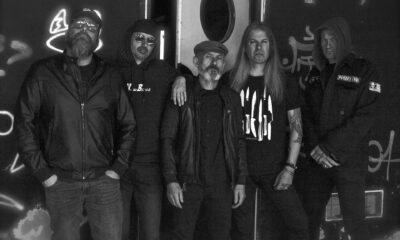
 Alternative/Rock1 week ago
Alternative/Rock1 week agoDeath Wishlist Are Fiery and Fierce with Their “I Get Bored” Video Premiere

